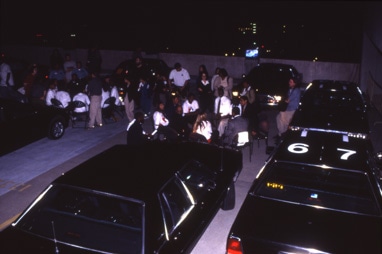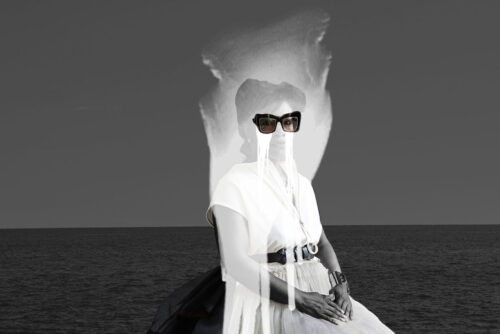U.S. Media Bias, the Administration’s “Information Warfare,” and the Stifling of Public Debate
It can be difficult to understand why much of the American public still wants to believe the nearly mythological justifications for the invasion. It is easy to see why people outside the United States cannot understand the “gullibility” of the American public and are confused by claims of seemingly uniform support for the Bush administration’s policies. But from inside the country, it is easier to understand.
Particularly since September 11, 2001, the mainstream American media has largely supported an aggressive war on terrorism and a “muscular” U.S. foreign policy. In the immediate aftermath of the September terrorist attacks, it was considered unpatriotic at best and treasonous at worst to publicly ask any questions about the root causes of terrorism or the appropriate responses to terrorism.
The assault on such questioning began almost immediately after the attacks and helped to foster an environment of fear of public discourse. One particularly high-profile case was that of late-night television’s Bill Maher, then host of ABC’s Politically Incorrect. Maher’s commentary on U.S. military responses to terrorism might have been ill-timed, but the response he received helped feed into a traumatized American psyche and contributed to stifling public questioning of administration policies. Sponsors withdrew support for the show, which was ultimately cancelled. According to Bush’s spokesperson Ari Fleisher, what had happened to Maher was appropriate and a signal to Americans that they “need to watch what they say, watch what they do, and this is not a time for remarks like that – there never is.” 1
Another high-profile incident occurred during the Iraqi invasion when the lead singer of a popular singing group, the Dixie Chicks, said she was embarrassed to be from the same state as Bush. Clear Channel, a corporation owning 1,200 radio stations in the United States, went immediately on the attack and called for all its stations to stop playing the band’s music. 2 Clear Channel, whose stations also helped organize pro-war rallies around the United States, also organized an event in Louisiana where a 33,000-pound tractor smashed Dixie Chicks CDs, tapes, and other paraphernalia. 3
The mainstream media has consistently presented positions that reinforced the administration’s point of view and left little room for debate and discussion, particularly in the lead-up to the war and during the invasion itself. For example, one survey of 414 Iraq-related stories on the three major U.S. networks between September 2001 and February 2002 found that all but 34 of the stories were sourced out of the White House, the Defense Department, or the State Department. 4
The situation did not improve once the invasion started. Fairness and Accuracy in Reporting (FAIR) began a three-week study on March 19, 2003, the day after the war began. They canvassed 1,617 on-camera sources in stories about Iraq on the evening newscasts of six U.S. television networks and news channels. 5 The major findings include the following:
Nearly two-thirds of all sources, 64 percent, were pro-war, while 71 percent of U.S. guests favored the war. Anti-war voices were 10 percent of all sources, but just 6 percent of non-Iraqi sources and 3 percent of U.S. sources. Thus viewers were more than six times as likely to see a pro-war source as one who was anti-war; with U.S. guests alone, the ratio increases to 25 to 1 . . . Looking at U.S. sources, which made up 76 percent of total sources, more than two out of three (68 percent) were either current or former officials . . . In the category of U.S. officials, military voices overwhelmed civilians by a two-to-one margin, providing 68 percent of U.S. official sources and nearly half (47 percent) of all U.S. sources. This predominance reflected the networks’ focus on information from journalists embedded with troops, or provided at military briefings, and the analysis of such by paid former military officials. 6
At the same time, despite the largest public protests in the streets of American cities since the height of the Vietnam War, the massive displays of opposition to official policy were barely acknowledged, let alone covered. Often, when there was coverage of antiwar events, it would be placed in inner sections of newspapers, as if they were entertainment or events of local significance, rather than displays of massive public opposition to national policy. Further, the FAIR study cited above found, for example, that:
Just 3 percent of U.S. sources represented or expressed opposition to the war. With more than one in four U.S. citizens opposing the war and much higher rates of opposition in most countries where opinion was polled, none of the networks offered anything resembling proportionate coverage of anti-war voices. 7
In the face of such a barrage of biased reporting, it is very difficult for individual citizens to believe that their opposition opinions, or even basic questioning of events, are anything but rare, isolated, and perhaps even “unpatriotic.” As Chris Hedges, a nonpacifist war correspondent for about 20 years, writes in his recent book, War is a Force That Gives Us Meaning
The effectiveness of the myths peddled in war is powerful. We often come to doubt our own perceptions. We hide these doubts, like troubled believers, sure that no one else feels them. We feel guilty. The myths have determined not only how we should speak but how we should think. The doubts we carry, the scenes we see that do not conform to the myth are hazy, difficult to express, unsettling. And as the atrocities mount, as civil liberties are stripped away (something, with the War on Terror, already happening to hundreds of thousands of immigrants in the United States), we struggle uncomfortably with the jargon and clichés. But we have trouble expressing our discomfort because the collective shout [emphasis added] has made it hard for us to give words to our thoughts. This self-doubt is aided by the monstrosity of war. 8
Another aspect of the assault on freedom of expression has been the passage of the U.S.A. Patriot Act, rushed through a panicked Congress and signed into law on October 26, 2001, allegedly to strengthen U.S. intelligence tools to fight terrorism. 9 The act actually makes it much easier for the government to spy on U.S. citizens in general, through “roving wiretaps,” which can follow the target rather than be confined to a specific telephone, for example; through surveillance of computer use; and through investigation of an individual’s library records. 10 Just as the media largely ignored public opposition to the invasion of Iraq, it has given scant coverage to opposition to the Patriot Act. Librarians and local governments across the country have been taking increasing action in opposition to the act. Librarians, for example, are organizing to repeal Section 215 of the act, which allows the FBI to secretly obtain court orders for access to library and bookstore records. 11 By March 2003, at least 160 municipalities and county governments in the United States had passed resolutions in opposition to the act. 12
The above outlines just the domestic public face of the attempts to mold U.S. public opinion. In a presentation in April 2003 in Washington, DC, a university professor analyzing the situation noted the administration’s “attempts to assert ‘full spectrum dominance’ over all levels of wartime communication . . . effacing the traditional boundary between battlefield deception and public sphere propaganda.” 13 Further, he stated,
According to defense analyst William Arkin, the Bush strategy lays out goals for information warfare that pursue D5E: “destruction, degradation, denial, disruption, deceit, and exploitation.” Arkin notes that the wide array of sites and practices of information control brought into the range of this policy “blurs or even erases the boundaries between factual information and news, on the one hand, and public relations, propaganda and psychological warfare on the other.” 14
The administration sought to carry out this strategy through an office in the Pentagon, the Office of Strategic Influence (OSI), created shortly after September 11, 2001, to generate support for the war on terror. 15 The OSI considered a range of options from standard public relations to the covert planting of disinformation in foreign media – an operation known as “black propaganda.” 16 Yet when plans for OSI were leaked to the New York Times, it reported “even many senior Pentagon officials and congressional military aides say they know almost nothing about its purpose and plans.” 17 With the leak of its creation to the press, the controversy generated resulted in Rumsfeld’s shutting OSI down within a week 18 – one day after Bush proclaimed zero tolerance for lies by American officials and vowed to “tell the American people the truth.” 19
Although OSI might have been publicly closed, it is likely the policy itself continued. As a Newsday columnist wrote at the time of the closing, “But don’t worry, Rumsfeld’s people were whispering yesterday around the Pentagon. They’ll keep on spreading whatever stories they think they have to – to foreigners especially. Call it the free flow of misinformation. Who needs a formal office for that?” 20 On November 18, 2002, en route to a meeting of defense ministers in Chile, Rumsfeld himself told reporters on his plane,
And then there was the Office of Strategic Influence. You may recall that. And “oh my goodness gracious isn’t that terrible, Henny Penny the sky is going to fall.” I went down that next day and said fine, if you want to savage this thing fine I’ll give you the corpse. There’s the name. You can have the name, but I’m gonna keep doing every single thing that needs to be done and I have. 21
Despite the controversy generated when the creation of OSI was revealed, these comments about the continuation of the policy went essentially unreported. As reported by FAIR, “A search of the Nexis database indicates that no major U.S. media outlets – no national broadcast television news shows, no major U.S. newspapers, no wire services or major magazines – have reported Rumsfeld’s remarks.” 22
In the period leading up to a possible second UN resolution to endorse the war in early 2003, when it was revealed that the administration’s National Security Agency was “conducting a secret ‘dirty tricks’ campaign against UN Security Council delegations in New York as part of its battle to win votes in favor of war against Iraq.” 23 The activities included intercepting the home and office phone calls as well as e-mails of country representatives to the United Nations in order to gather information as to how they might vote on the resolution. Much more concern was generated in the international media than in the U.S. press. 24
- Mark Armstrong, “White House Politically Corrects Maher,” E! Online News, September 27, 2001, http://www.eonline.com/News/Items/0,1,8886,00.html.[↑]
- Norman Soloman, “Media Nix: From Blix to Kucinich to the Dixie Chicks,” Global Policy Forum, April 24, 2003, http://www.globalpolicy.org/security/issues/iraq/media/2003/0424medianix.htm.[↑]
- Paul Krugman, “Channels of Influence,” New York Times, March 25, 2003, available online at Common Dreams News Center, http://www.commondreams.org/views03/0325-03.htm.[↑]
- In 2001, a total of 14,632 sources were interviewed by the three major network’s evening news broadcasts. Of these, the percentage who were white: 92, the percentage who were male: 85, the percentage who were Republican, when party noted: 75., and the percentage who were the president: 9; see “The Usual Suspects,” Utne, Nov./Dec. 2002. See also FAIR, http://www.fair.org, particularly the section “Iraq and the Media,” http://www.fair.org/international/iraq.html.[↑]
- The news programs studied were ABC’s World News Tonight, CBS’s Evening News, NBC’s Nightly News, CNN’s Wolf Blitzer Reports, Fox’s Special Report with Brit Hume, and PBS’s NewsHour with Jim Lehrer.[↑]
- Steve Rendall and Tara Broughel, “Amplifying Officials, Squelching Dissent: FAIR Study Finds Democracy Poorly Served by War Coverage,” FAIR, May/June 2003, http://www.fair.org/extra/0305/warstudy.html.[↑]
- Rendall and Broughel, “Amplifying Officials.” The antiwar percentages ranged from 4 percent at NBC, to 3 percent at CNN, ABC, PBS, and FOX, to less than 1 percent – one out of 205 U.S. sources – at CBS.[↑]
- Chris Hedges, War Is a Force that Gives Us Meaning (New York: Public Affairs, 2002).[↑]
- Uniting and Strengthening America by Providing Appropriate Tools Required to Intercept and Obstruct Terrorism (U.S.A. Patriot Act) Act of 2001, HR 3162, 107th Congress, 1st sess. (October 24, 2001), available online at Electronic Privacy Information Center, http://www.epic.org/privacy/terrorism/hr3162.html.[↑]
- Much analysis has been written about the impact of the U.S.A. Patriot Act. See, for example, Mary Minnow, “The U.S.A. Patriot Act and Patron Privacy on Library Internet Terminals,” Law Library Resource Xchange, February 15, 2002, http://www.llrx.com/features/usapatriotact.htm; Center for Constitutional Rights, “The State of Civil Liberties: One Year Later. The Erosion of Civil Liberties in the Post 9/11 Era,” n.d., http://www.ccr-ny.org/v2/whatsnew/report.asp?ObjID=nQdbIRkDgG&Content=153.[↑]
- Chris Finan, “Opposition to the U.S.A. Patriot Act Is Growing,” American Booksellers Association, November 14, 2002, http://news.bookweb.org/freeexpression/943.html.[↑]
- Brian Seals, “Watsonville Joins Opposition to Patriot Act,” Santa Cruz Sentinel, March 26, 2003, http://www.santacruzsentinel.com/archive/2003/March/26/local/stories/02local.htm.[↑]
- Gordon R. Mitchell, “Legitimation Dilemmas in the Bush National Security Strategy,” (paper presented at the Eastern Communication Association Conference, Washington, DC, April 23-26, 2003).[↑]
- William M. Arkin, “Defense Strategy: The Military’s New War of Words,” Los Angeles Times, November 24, 2002; quoted in Mitchell, “Legitimation Dilemmas.”[↑]
- CNN, “New Pentagon Office to Spearhead Information War,” February 20, 2002, http://www.cnn.com/2002/US/02/19/gen.strategic.influence/.[↑]
- Tom Carver, “Pentagon Plans Propaganda War,” News, BBC, February 20, 2002, http://news.bbc.co.uk/1/hi/world/americas/1830500.stm. In this article Carver writes, “Some generals are worried that even a suggestion of disinformation would undermine the Pentagon’s credibility and America’s attempts to portray herself as the beacon of liberty and democratic values.”[↑]
- James Dao and Eric Schmitt, “Pentagon Readies Efforts to Sway Sentiment Abroad,” New York Times, February 19, 2002, available online at Common Dreams News Center, http://www.commondreams.org/headlines02/0219-01.htm.[↑]
- For a full transcript of Rumsfeld’s remarks to the press at the announcement of the closing of OSI, see U.S. Department of State, International Information Programs, “U.S. Closes Office of Strategic Information: Says Effectiveness Damaged by Media,” February 27, 2002, http://usinfo.state.gov/regional/nea/sasia/text/0227rmfd.htm.[↑]
- Norman Soloman, “Pentagon’s Silver Lining May Be Bigger Than Cloud,” Media Beat sec., FAIR, February 28, 2002, http://www.fair.org/media-beat/020228.html. Soloman was reporting on a column by Ellis Henican in Newsday.[↑]
- Soloman, “PentagonÕs Silver Lining.”[↑]
- FAIR, “Media Advisory: The Office of Strategic Influence Is Gone, But Are Its Programs in Place?” November 27, 2002. For a full transcript of Rumsfeld’s remarks, see the U.S. Department of Defense, DefenseLink, http://www.dod.gov/news/Nov2002/t11212002_t1118sd2.html. For a discussion of the continued programs, despite the closing of the OSI, see William Arkin, interview with Bob Garfield and Brooke Gladstone, “Global Information War in the Works?” On the Media, WNYC, December 13, 2002, http://www.wnyc.org/onthemedia/transcripts/transcripts_121302_information.html.[↑]
- FAIR, “Media Advisory: The Office of Strategic Influence Is Gone.” [↑]
- Martin Bright, Ed Vulliamy, and Peter Beaumont, “U.S. National Security Agency Memo Reveals Spying on U.N. Delegates,” Observer, March 3, 2003, available online at ReclaimDemocracy.org, http://reclaimdemocracy.org/weekly_2003/spying_on_un.html.[↑]
- Bright, Vulliamy, and Beaumont, “U.S. National Security Agency Memo.”[↑]



